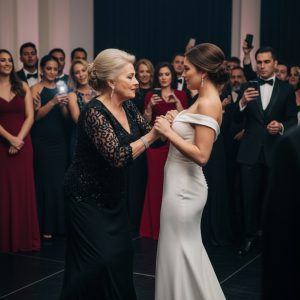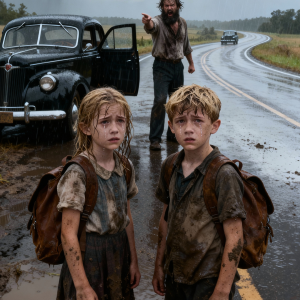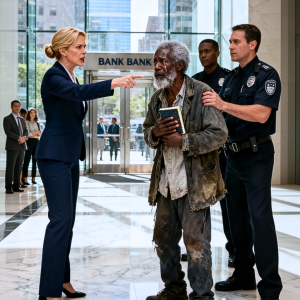
In the crowded streets of Rio de Janeiro, twelve-year-old Rafael had already learned lessons about survival that many adults never faced. Growing up in the Santo Antônio orphanage, he had known scarcity and loneliness, surviving on thin slices of bread, lukewarm water, and a blanket that carried the scent of damp walls. Yet, despite the hardships, there was a light in Rafael that nothing could extinguish: an unshakable hope.
Each afternoon, he helped the younger children, repairing broken toys, telling imaginative stories, and coaxing laughter from their small faces. The orphanage director, Dona Marisa, often said, “Rafael, your heart is bigger than you know. One day, the world will see it too.” Rafael smiled politely but never truly believed miracles were meant for him. That changed on a rainy morning in December.
Rafael had gone to a busy street corner to sell candy, dodging umbrellas and honking cars. Suddenly, he witnessed a sleek black vehicle skid on the slick asphalt and crash into a light post with a deafening crunch. The windshield shattered violently. While most onlookers froze, unsure of what to do, Rafael ran instinctively toward the wreck.
“Sir! Are you all right?” he shouted, heart hammering.
Inside, a man in a tailored suit was slumped and bleeding, barely conscious. Rafael’s hands shook as he fumbled with the seatbelt, freeing the man and dragging him onto the sidewalk. He called out for help, his voice mixing panic with determination. Within minutes, firefighters arrived, rushing the injured man to an ambulance. Rafael, soaked to the skin, stayed by his side until the doors closed. A paramedic leaned over and asked, “Young man, what is your name?” “Rafael,” he replied simply.
News of the act spread quickly. Two days later, newspapers carried bold headlines: “Street Boy Rescues Billionaire Ricardo Almeida from Fatal Car Crash.” Ricardo was a reclusive tech magnate, widowed for years, known as much for his fortune as for his solitary existence. When he regained consciousness in the hospital, his first question was for the boy who had saved him.
Rafael, dressed in borrowed clothes and worn shoes, was led to Ricardo’s hospital room. The billionaire’s gaze lingered on him, assessing the courage etched into the boy’s small frame. “Weren’t you afraid?” Ricardo asked. “Yes, I was… but fear came after,” Rafael admitted. The honesty in his eyes disarmed Ricardo, coaxing a faint, genuine smile from a man who had not smiled in years.
Soon, Rafael began visiting the hospital regularly, recounting tales from the orphanage, mimicking the antics of his friends, and drawing laughter from the quiet billionaire. Ricardo listened as if the boy’s words had a magic of their own, reminding him of the simplicity and joy life could hold. When Ricardo was discharged, he insisted on accompanying Rafael back to the orphanage.
“I want to help this place, Marisa,” Ricardo told the director, his voice steady but sincere. “Renovate the buildings, hire more caregivers. Rafael saved my life, and now it is my turn to give back.”
What began as gratitude deepened into something rare and profound. Ricardo became a fixture at the orphanage, not just delivering books and clothes, but giving his time, his attention, and his heart. At night, he would pore over photographs of his late wife and the son he had lost in a house fire years ago. The grief never faded, but Rafael offered a connection that almost felt like a second chance.
One afternoon, as they walked among the small gardens behind the orphanage, Rafael asked, “Did you have a child?” Ricardo took a slow breath. “I did. He died long ago.” Rafael’s eyes widened. “And if he were alive?” Ricardo’s lips curved in a faint, bittersweet smile. “He would be your age.”
Weeks turned into months. Rafael spent weekends at Ricardo’s mansion, learning to read, navigate a computer, and ride bicycles in the sprawling gardens. The household staff grew fond of the boy’s energy and warmth, though not everyone welcomed his presence. Rafaela, Ricardo’s ambitious niece, feared that the boy’s closeness to her uncle threatened her inheritance.

“You are too attached to him, Uncle,” she warned coldly. “Be cautious. Do not be deceived.” Ricardo met her gaze with quiet authority. “He saved me, Rafaela. More than that, he reminded me of life itself.”
A year later, Ricardo invited Rafael and Marisa to a grand dinner. With a formal hush over the table, he made an announcement that stunned everyone present. “Rafael, you will be my son, legally, from this day forward.” The revelation left the room in disbelief. Marisa wept. Rafaela’s face drained of color. Rafael could barely speak. “You… want to be my father?” he whispered. Ricardo’s voice was firm yet tender. “I am your father, from now on.”
But fortune and joy often attract envy. Rafaela hired an investigator to dig into Rafael’s past, seeking a reason to challenge the adoption. The search uncovered a shocking truth hidden among old documents: Rafael’s birth records had been altered. He matched the boy who had vanished in the fire years before, the son Ricardo had mourned endlessly. Rafael… was the lost heir.
The revelation shattered everything. Ricardo called Rafael into his office, showing him a scorched gold necklace discovered among the rubble. “This belonged to you,” Ricardo whispered, tears streaming. Rafael’s body trembled, overwhelmed by the realization that he had returned to the father he had never known. DNA confirmed the truth, silencing all doubt.
For Rafael, titles and wealth mattered little. What filled him was the discovery of a father who truly loved him. Ricardo, renewed by this bond, dedicated himself to teaching Rafael everything about life, integrity, and purpose.
When Ricardo passed away two years later, the funeral drew crowds of dignitaries and journalists, but only Rafael grieved freely, wearing the scorched necklace over his heart. In Ricardo’s will, Rafael inherited more than wealth. Among the legal documents lay a letter: “Rafael, the real miracle was not your courage in that accident, but fate granting me a second chance to be your father. Use what I leave to save lives, to help children who, like you once, are lost but full of light.”
Years later, Rafael transformed Ricardo’s mansion into a foundation for orphaned children, naming it the Ricardo Almeida Institute. Every night, gazing at the stars, he whispered softly, “Father, I hear you. I will continue saving lives, just as you saved mine.”




